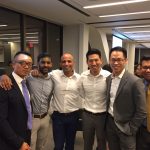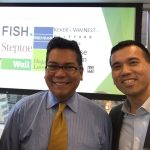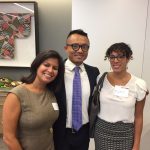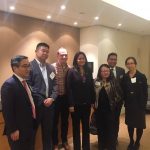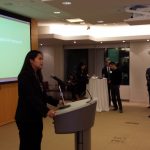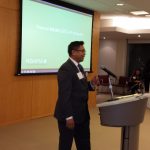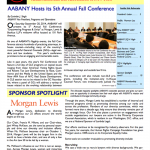Hinshaw & Culbertson LLP Hosts AABANY LGBT Committee
On March 17, the AABANY LGBT Committee held Being Out and Asian Pacific Islander at Work at Hinshaw & Culbertson LLP. The discussion centered around personal experiences and how to deal with negative stereotypes and stigmas in the workplace.
Thank you to all those who made the event possible, especially Hinshaw & Culbertson LLP for hosting. Hinshaw & Culbertson LLP shared on their Facebook page:
Thank
you to the AABANY LGBT Committee for allowing us to host “A Discussion
on Being Out and API at Work in the Legal Community” in our New York
office yesterday.Attendees from law firms, in-house corporate
counsel, public interest organizations and government practices shared
their day-to-day experiences with interacting with others, and discussed
the challenges they face.
Obergefell v. Hodges: A Victory For Asian Pacific Americans
By John Vang
AABANY LGBT Committee
The U.S. Supreme Court’s decision in Obergefell v. Hodges, 576 U.S. ___ (2015), was monumental. Legally, Obergefell extended the fundamental right to marry, rooted in the Fourteenth Amendment’s due process and equal protection clauses, to same sex couples. Socially, it powerfully affirmed same sex relationships and represented, for some, the culmination of a long movement for gay rights, and, for others, simply one step, albeit a significant one, in a continued struggle for full equality.
For myself and other gay Asian Pacific Americans (APAs), our families, and communities, the decision’s impact is real. The Williams Institute estimates that 325,000 APA adults in the United States identify as lesbian, gay, bisexual or transgender (LGBT). Nearly 33,000 APA persons are in same-sex relationships with over a quarter raising children. The numbers are undoubtedly greater when accounting for those not reporting. By recognizing same sex marriages, the Supreme Court ruling has dramatically transformed our communities and has also implicated matters that inhere in marriage, such as immigration, as nearly 20 percent of APA individuals in same-sex couples are non-citizens.
Compellingly, Obergefell conveys an important cultural message. I come from a conservative, Christian Asian American family. For such a family, strongly influenced by rule of law and authority, the decision in many ways, takes out of the debate the wrongness or rightness of same-sex relationships, as there can be no greater validation afforded than by that of the highest court of the land. Of course, as a nation, the ruling remains contentious, as Americans, framing objections primarily in religious terms, remain divided on the issue. Within the APA community, responses to same-sex marriage have ranged from full acceptance (such as by the Japanese American’s Citizen’s League, the first non-LGBT national ethnic organization to take a stand in support of gay marriage) to outright hostility (such as Hak-Shing William Tan, a Chinese American evangelical supporter of California’s Proposition 8, notoriously warning that if same-sex marriage were to be treated as civil right, then so too would pedophilia, polygamy and incest).
Whatever the opinions, however, for APAs, the ruling elicits parallels between struggles for gay and APA rights. Obergefell drew from the Supreme Court’s 1967 ruling in Loving v. Virginia, commonly understood as legalizing marriages between black and white persons. But Loving also overturned anti-miscegenation laws that explicitly targeted APAs, a legacy of anti-Asian exclusion in the U.S. Thus, Obergefell reinforces that, from exclusion and obscurity to inclusion and acceptance, the movement for APA rights is inseparable from that of LGBT rights.
This landmark decision marks a new era, but we must continue to foster visibility, pride, and acceptance for LGBT Asian-Americans in our families, communities, and the nation at large. Supporting organizations such as NQAPIA (National Queer Asian Pacific Islander Alliance) doing groundbreaking work to assert APA LGBT visibility nationwide is critical in that regard.
Moreover, we must strive for justice in the areas that continue to affect our communities, such as discrimination in employment, public accommodations, and housing, as well as pushing for immigration and criminal justice reform. As the court poignantly put it: “The nature of injustice is that we may not always see it in our own times. The generations that wrote and ratified the Bill of Rights and the Fourteenth Amendment did not presume to know the extent of freedom in all of its dimensions, and so they entrusted to future generations a charter protecting the right of all persons to enjoy liberty as we learn its meaning. When new insight reveals discord between the Constitution’s central protections and a received legal stricture, a claim to liberty must be addressed.” As Asian Pacific Americans we applaud this decision and continue in the movement for full equality.
This article was originally published in the Summer 2015, Volume XVI, Issue III of The AABANY Advocate, which can be read in its entirety here. To see all past versions of The AABANY Advocate, click here. To learn more about AABANY’s newsletter, you can email naf.kwun@aabany.org.
To learn more about AABANY’s LGBT Committee, click here. You can email Co-Chair Glenn Magpantay at glenn.magpantay@aabany.org.


